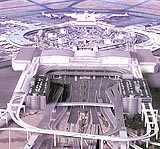IBEW Staff Energizes San Francisco
Airport "People Mover"
November 14, 2005 (Part 3 in a series)
Unions
win organizing drives when workers are moved to join together for
a voice on the job. In 2003, it was the workers who operate
and maintain the AirTrain people mover system at San Francisco
International Airport who were, themselves, moved to join San Mateo,
California IBEW Local
617.
Since
then, they have negotiated a healthy contract with Primus, a sub-contractor
for AirTrain's prime-contractor, Bombardier Transportation, and
then defended the contract in 2005 when Bombardier bought out Primus.
"Another
union tried to organize us in 2002, but they lost an election because
they didn't listen to us or involve us sufficiently in the campaign," says
Fred Corona a central control operator and member of the volunteer
organizing committee at Primus. Corona, who was later hired as
a Local 617 business agent, says that IBEW patiently met with workers,
who cover shifts around the clock, seven days a week, to make certain
that the union had enough support before filing a petition for
a representation election.
It
wasn't easy to gain access to Primus employees who worked in secure
areas of the airport and on the vehicles that shuttle between the
airport's car rental centers and all terminals. But Dominick Nolan,
Local 617 organizer, was on hand to meet them as they filed into
the airport's public areas for lunch. Nolan says that the company
heard about the IBEW's petition and immediately offered wage and
benefit improvements in an attempt to undermine the union's support.
When
the company increased pay $1.00 per hour and established a 401-K
retirement program, says Nolan, it only confirmed the effectiveness
of the union's leverage. IBEW then petitioned for a representation
election.
Nolan
counseled the volunteer organizing committee to expect resistance
from management. It came fast. Primus hired a union-busting
firm, held one-on-one and group meetings to discourage union activity
and sent letters to the workers' homes urging them to reject the
union.
Local
617 organizers decided to take extraordinary steps to involve the
membership prior to the election.
Before
the election, a negotiating committee was established. Questionnaires
were sent to all employees, who were asked to rate their most pressing
needs.
On
August 29, 2003 the workers selected IBEW by a vote of 29 to 8.
Difficult negotiations on a first contract followed.
Primus
workers voted to set up informational picket lines in support of
an unfair labor practice complaint filed in the midst of negotiations
by Local 617. When the local held a strike authorization vote,
98 percent of the bargaining unit voted to shut down the system
if contract talks reached an impasse.
The
local called upon former San Francisco Mayor Willie Brown, who
had appointed members of the airport's governing commission, to
help reach an agreement with Primus.
The
internal unity paid off. Fourteen months after choosing
the IBEW, the workers won an hourly wage of over $24 per hour (a
$2 per hour increase), a $1,000 bonus, comprehensive family medical
benefits under Kaiser, two extra days off in 2007 and yearly raises
of three percent from 2006 through 2008.
In
February 2005, with airline patronage rising and new hotels and
terminals being built, Bombardier decided to buy back Primus' interests
and notified the union that they desired some concessions, but
IBEW 617 was able to maintain the conditions of the prior contract.
 |

